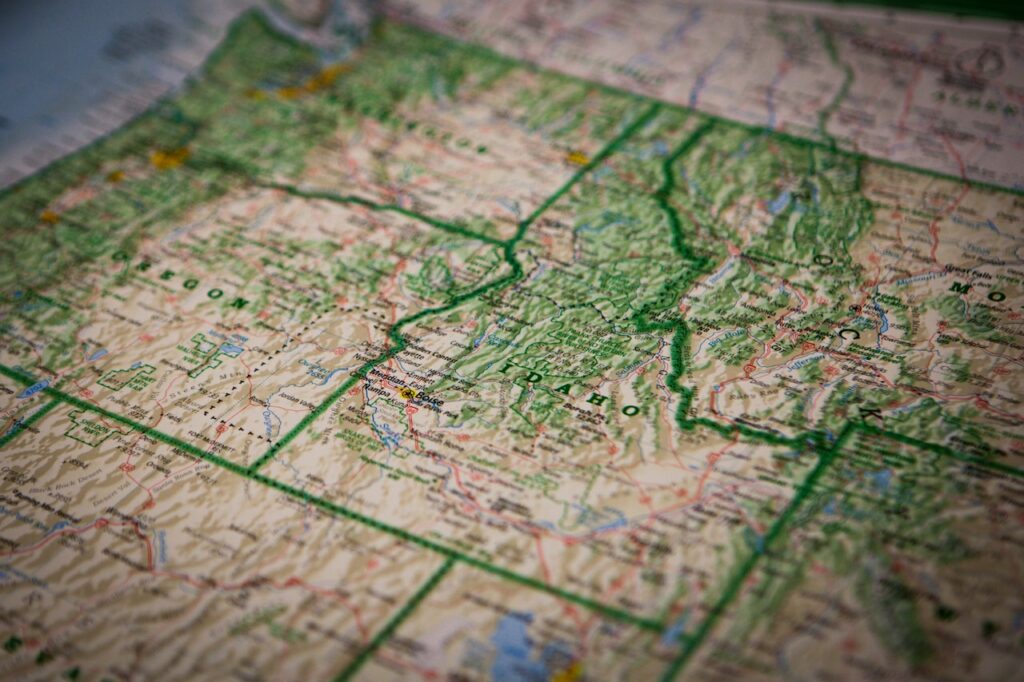Which are the worst places for U.S. retirees?
After decades of hard labor, retirement should be relaxing and fun. However, selecting where to retire may greatly impact a retiree’s quality of life. Despite their fame or beauty, certain sites may not be ideal. Utilities, healthcare, social participation, and cost of living are all factors. When the retiree has a tight budget, these factors are much more important.This post uncovers eleven states that may not be retiree-friendly. We will uncover surprising realities about each state’s unique issues to assist future retirees in making the best option for their requirements and circumstances. In these U.S. states, retirement life may surprise you.

Alabama
Retirement in Alabama is popular. With its mild temperature, gorgeous scenery, and Southern charm, it’s little wonder people retire there. Alabama’s pleasant appearance may deceive retirees. The state’s unexpected obstacles might ruin a retiree’s finances and lifestyle.
Alabama’s low cost of living suggests minimal utility expenses. However, retirees are typically surprised by hefty utility expenditures. Alabama summers need strong air conditioning. Winters are moderate, although there are still chilly days that need heating. These factors raise electrical expenses, straining retirees’ finances.
Alabama has unanticipated healthcare issues for the elderly. According to Commonwealth Fund statistics, the state has poor healthcare quality. Since Alabama has many Medicare members with high deductibles, seniors may pay more for healthcare. Unexpected healthcare costs might stretch seniors’ budgets.
Alabama elderly confront inadequate senior facilities and high healthcare bills. The state has fewer senior living communities and nursing institutions per capita than the country. Due to shortage, seniors may have to wait longer for admittance or settle for a facility that doesn’t fulfill their requirements. Seniors who need these amenities may suffer from this restricted access.
Alabama also fails elders on public transit. A University of Alabama research found the state had one of the lowest public transportation rates. Seniors, especially those who no longer drive, may struggle to attend medical appointments and grocery stores due to a lack of public transit. Poor transportation alternatives might restrict elders’ freedom and mobility, making daily living difficult.
South Dakota
For retirees, South Dakota is idyllic. From Mount Rushmore to Badlands National Park, this state has breathtaking scenery. However, prospective retirees should know that South Dakota has unexpected challenges that might make your golden years difficult.
South Dakota has severe winters with significant snowfall and frigid temperatures. Thus, winter heating bills often surprise the elderly. To keep houses warm and secure, seniors with limited income may struggle with high heating expenditures.
Mental and emotional wellness depend on retirement socialization. South Dakota has fewer senior social options than other states. Rural areas impede senior-friendly cultural, social, and community events. Isolation may harm retirees.
South Dakota has healthcare challenges. According to the Health Care Cost Institute, the state has greater healthcare expenses than the national average. These hefty prices might surprise and distress retirees, who frequently have more medical requirements. The state’s rural character makes healthcare access more difficult.
South Dakota lacks senior-friendly homes. Retirement residences and assisted living facilities are scarcer in the state than nationally. Older homes may not meet elders’ physical requirements. Seniors seeking pleasant, accessible homes may face this scarcity.
RELATED ARTICLE: Want to Retire Under 50? Start With These Easy Steps Right Now!
Kentucky
Many retirees romanticize Kentucky, the Bluegrass State. Kentucky’s rolling landscapes, historic buildings, and horse country are lovely. This lovely state hides unanticipated issues that might greatly hurt seniors.
Utility costs in Kentucky may shock retirees. It features hot, humid summers and freezing winters. Since air conditioning and heating are needed, they use a lot of energy. Despite the state’s cheap cost of living, significant electricity expenditures often surprise retirees.
Despite Kentucky’s cheaper cost of living, senior living complexes may be expensive. Seniors who need assisted living or a retirement facility may pay much more. Unexpected charges may deplete retirement funds and make retirement less pleasant.
Kentucky has unique healthcare issues for retirees. The state has improved healthcare access. However, rural regions still lack healthcare services. Seniors may have to travel far for medical visits due to a shortage of facilities.
Kentucky’s slower pace and natural beauty may appeal to many, but seniors may have few entertainment alternatives. Kentucky lacks senior-friendly cultural and leisure activities. Hiking and horseback riding may not appeal to all retirees, but the state offers them. Kentucky retirement may disappoint due of a lack of social activities.
Oklahoma
Retirees may find Oklahoma’s plains, woodlands, and Native American history attractive and affordable. However, upon deeper study, this state has numerous unforeseen issues that might greatly impair senior life quality and cost.
Oklahoma retirees are often surprised by high utility costs. The state needs air conditioning and heating from hot, humid summers to freezing winters. Retirees on fixed incomes struggle with high utility expenses. This extra expense may raise Oklahoma’s cost of living. Senior homeowners may struggle with high property taxes in the state. This unanticipated expenditure might impact budgeting and Oklahoma retirement affordability.
Seniors need adequate healthcare, and Oklahoma delivers another surprise. America’s Health Rankings scores the state poor in healthcare availability and quality. In remote locations, where medical services are few, elders may have to travel far for appointments. Retirees’ restricted access to high-quality healthcare might stress and harm them.
Seniors, especially non-drivers, need public transit. Oklahoma lacks public transit. Seniors have trouble getting to medical appointments, grocery stores, and social events since public transportation is scarce in many sections of the state. Public transit may significantly restrict a senior’s freedom and movement, making daily living difficult.

New Hampshire
With its charming beauty and slower pace of life, New Hampshire, known as the Granite State, may seem like a perfect retirement location. The White Mountains and many lakes are stunning. This pleasing exterior hides various issues for seniors that might severely impair their retirement experience.
New Hampshire pensioners face exorbitant home heating costs due to the state’s harsh winters. Retirees on a fixed income may struggle to afford heating during hard winters.
High property taxes in New Hampshire often surprise retirees. New Hampshire has a high property tax. This may affect homeowners’ retirement funds. Retirees contemplating New Hampshire must consider this.
New Hampshire has many outdoor activities like hiking and boating but lacks senior-friendly entertainment. New Hampshire has fewer senior-focused cultural and leisure events than larger metropolitan states. Lack of amusement may make retirement lonely and boring.
Finally, New Hampshire’s healthcare availability is limited. Despite its excellent healthcare rankings, the state has difficulties, particularly in rural regions. Seniors may have to travel far for medical visits or lack specialist care. This may stress the elderly and pose health hazards.
Montana
Montana, known as “Big Sky Country,” has gorgeous plains, crystal-clear lakes, and rugged mountain scenery that may appeal retirees seeking quiet. Montana’s natural beauty masks numerous unexpected issues that might influence retirees’ financial security and enjoyment of life.
Montana retirees may face exorbitant power costs. The state’s topography and climate may increase heating and cooling demands, raising energy expenses. Retirees on fixed incomes may struggle financially. Seniors must balance these expenditures with comfort.
Montana’s cost of living is higher than average despite its rural nature. Retirees are typically surprised by high housing, grocery, and healthcare costs. Montana seniors must include these fees while preparing for retirement to guarantee a pleasant existence without depleting their resources.
Seniors may also struggle with Montana’s public transit shortage. Public transportation is scarce in many rural locations, making it difficult for non-drivers to reach food shops, healthcare institutions, and social activities. Seniors’ independence and community participation may be severely hampered by inadequate public transit.
Finally, Montana retirees worry about excellent elder care. In rural Montana, healthcare choices are limited, although Billings and Missoula have outstanding facilities. Seniors may have to travel far for frequent checkups or specialty treatment, adding to their burden.
Oregon
Oregon’s gorgeous coastline, lush woods, and laid-back lifestyle make it a dream retirement spot. However, Oregon may be more expensive than expected for seniors. This high cost of living puts pensioners under financial duress.
Oregon elders may struggle with utility costs. The state’s climate ranges from humid coastal parts to dry, scorching interior. This version requires year-round heating and cooling, which raises energy expenditures. These expenses might strain retirees’ budgets.
Many retirees underestimate Oregon’s elder living costs. Oregon senior housing alternatives are expensive. Seniors may have underestimated the expense of assisted living or retirement residences in the state.
Oregon offers many outdoor activities, but few for seniors. Despite booming cities like Portland and Eugene, the state lacks senior-friendly cultural and social events. Lack of senior-focused entertainment may cause social isolation and lower Oregon retirement quality.
Finally, Oregon elders worry about expensive healthcare. Despite the state’s good health score, healthcare expenses might be much higher than average. For retirees who require regular medical care, Oregon is unexpectedly pricey.
Idaho
Idaho, the Gem State, is recognized for its beautiful mountains, lakes, and woods, making it a tempting retirement location. Despite its natural beauty, Idaho has certain unexpected expenditures that retirees should consider since they may dramatically damage their retirement experience and financial security.
Idaho retirees may confront hefty utility costs. Idaho has scorching summers and frigid winters. This requires air cooling and heating, which raises utility expenditures. These prices may startle seniors and stretch their retirement budgets.
Idaho has a high cost of living despite its affordability. Retirees face rising costs for housing, food, and healthcare. Seniors seeking a stress-free retirement in the state may be surprised by the high expense of living.
Idaho has many outdoor activities, but few for seniors. Seniors might feel lonely and bored without senior-specific cultural and social activities. Idaho’s limited alternatives may disappoint active retirees.
Seniors’ healthcare in Idaho presents a new problem. Despite having good hospitals, medical treatment may be expensive. Even with good health insurance, this may cause large out-of-pocket costs. For seniors who require regular or specialized medical treatment, finding inexpensive healthcare may be a major issue.














